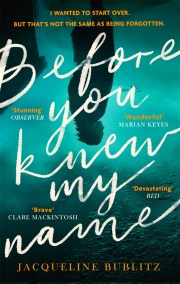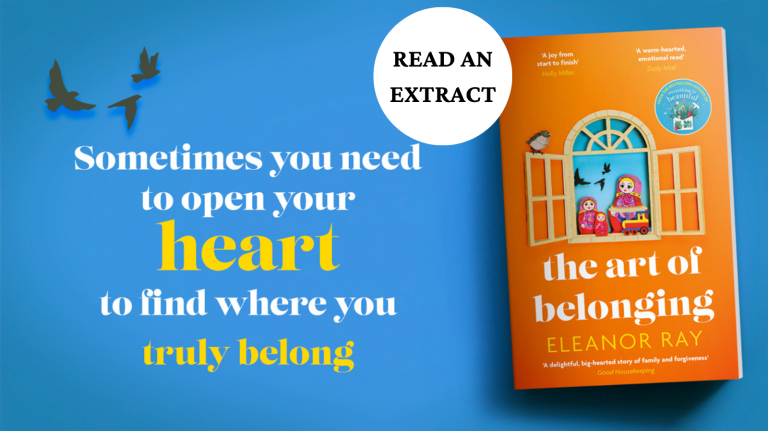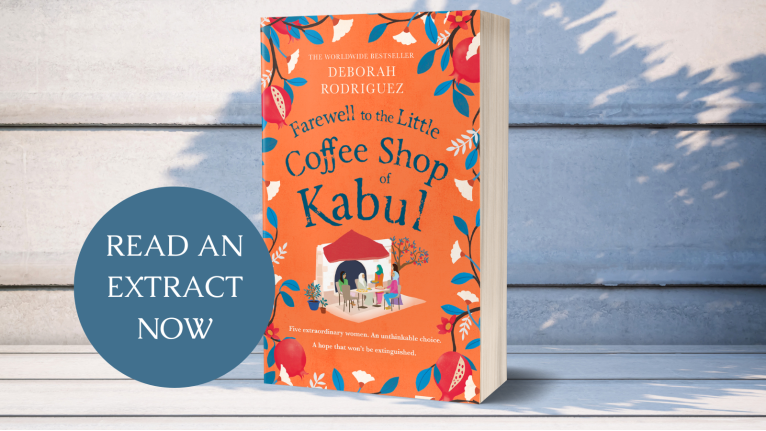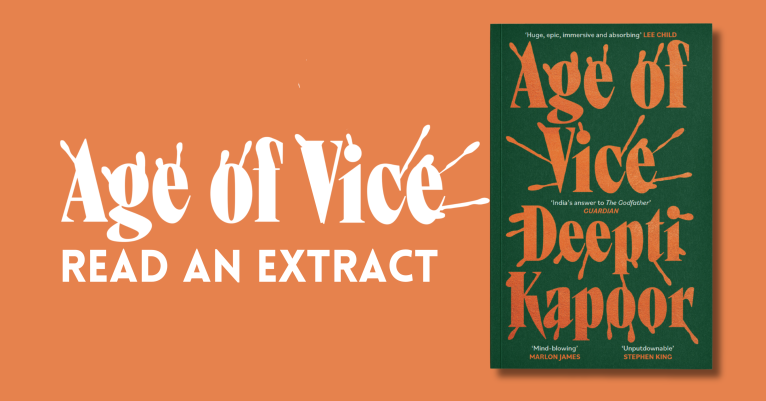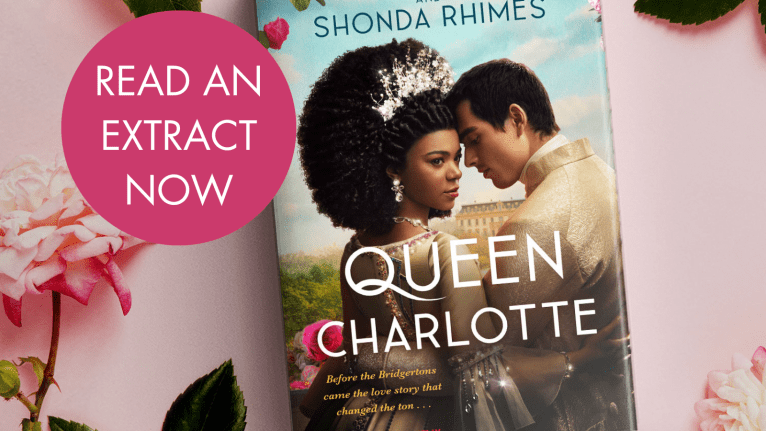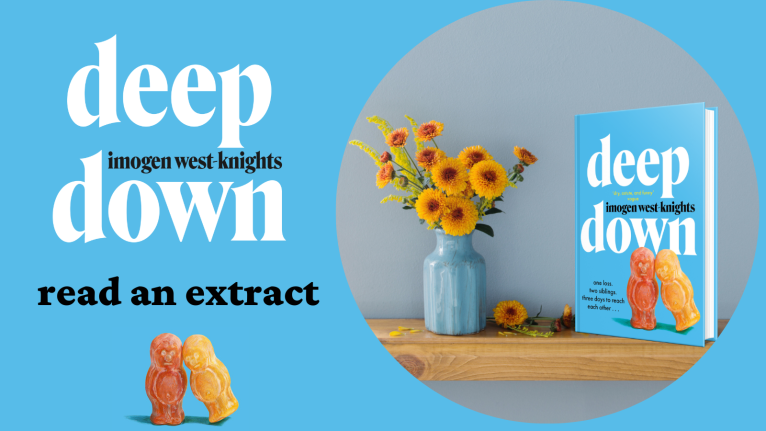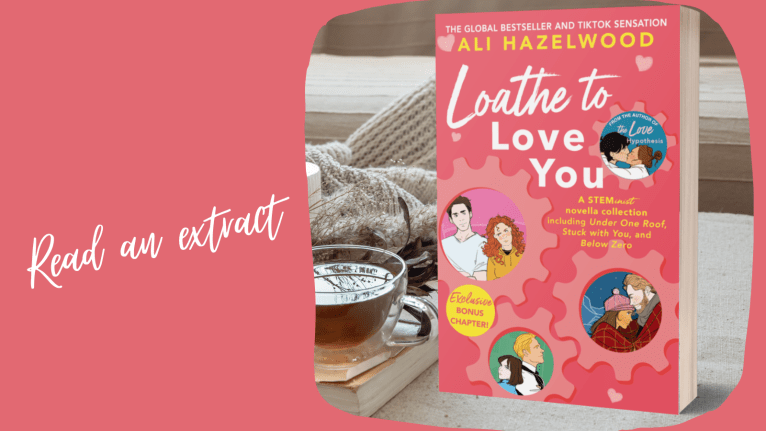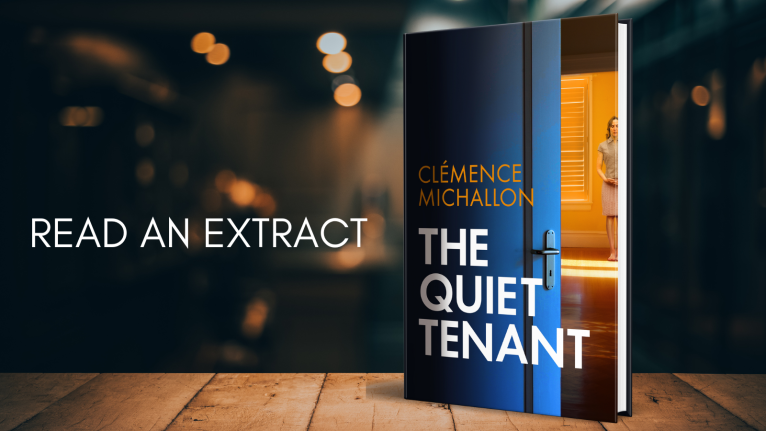Before You Knew My Name: Read an extract from Alice
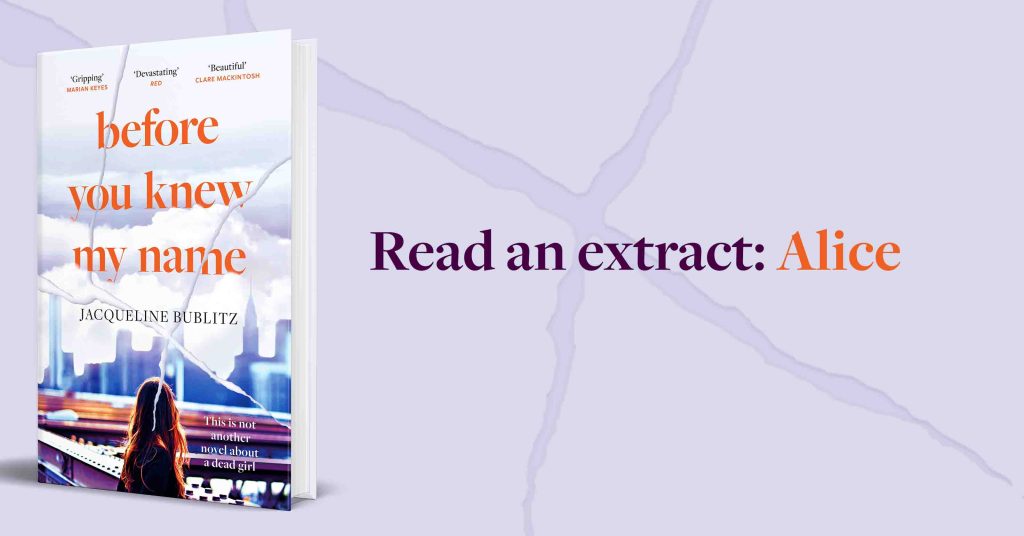
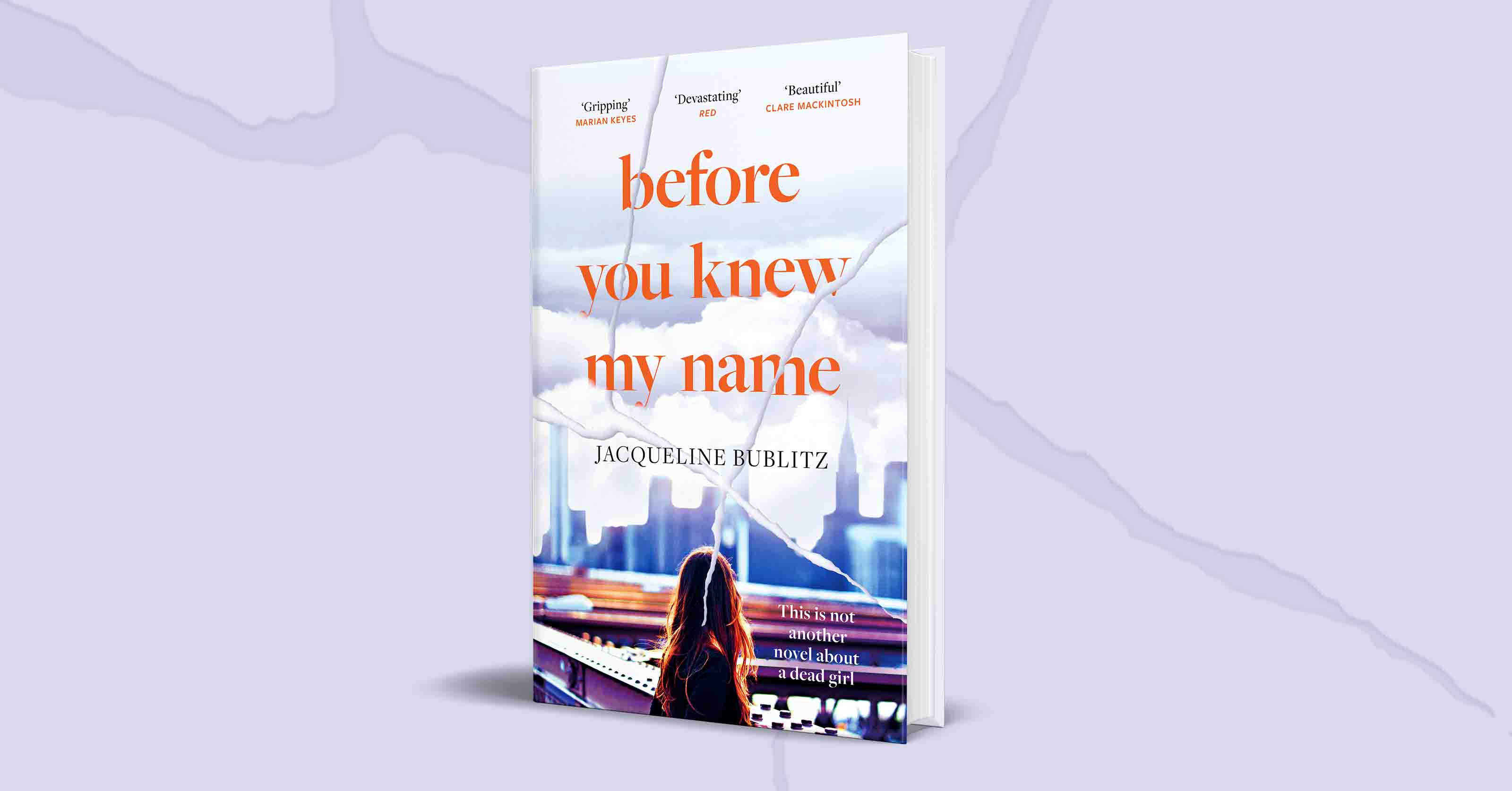
Before You Knew My Name is a startling, moving and uplifting novel about two women, Ruby and Alice, brought together in the most extreme of circumstances.
They were always going to meet. But it didn’t need to be like this.
Alice
In the hours before I die, Ruby Jones has slept on her anger and wakes up coated in it. Outside it is raining heavily, but she barely notices the weather. It is 5.55 a.m., early for her, but she is already up, pacing back and forth across the small path made between her desk and the bed. God, this studio is too small! Filled up with unnecessary things. She straightens the TV remote, pats down the corners of the bed, shifts her hairbrush to the bedside drawer. Does a 360- degree turn, then removes the hairbrush, turns the remote sideways again.
This is how people go crazy, she thinks. I need to get out of this room.
As she puts on her running shoes, Ruby hears a boom of thunder. Or it could be the hard slam of a car door. She strains against the sound and then shrugs. No matter, she’s not afraid of a storm. A little rain never hurt anybody.
The street is empty as she exits her building and heads west towards Riverside Park, rain spiking across her face. At the first intersection, already saturated, she considers turning back, then remembers the pacing, the locked-in feeling she’s had since yesterday.
‘Fuck it!’ she shouts out, and waits to cross with the signal, though there are no cars on this part of the road. There is no one to startle on the street either, no dog walker with their twist of leashes, no nanny carefully guiding a wobbly-legged toddler. As Ruby reaches Riverside Drive, she finally encounters cars, a row of them stop starting, gushing by, each one sending up a spray of water as they pass. It is proof, at least, of other people. Even if she is the only one out here running in the rain.
Ruby considers staying on Riverside, but the pavement is narrow, and when car after car sends a muddy shower her way, she pivots and heads into the park. It’s darker than she anticipated, the sky looks as if it is closing in around the trees, but she keeps going, sure there will be other runners and cyclists down on the waterfront trail. As she cuts through the upper levels of the park, Ruby searches for the stairs to take her down to the water, but the thick clusters of trees on either side of her don’t look like she remembered them to be. Perhaps she has entered at a different spot today. Riverside Park is still new to her, and the weather may have turned her around, somehow. She knows from her maps that the park stretches for blocks, street above, river below, so it’s not like she could get lost. She just needs to keep heading south, she tells herself, until she finds a landmark she recognises, something to orient her. Still, she feels a brief flicker of panic.
Thunder claps loudly over her head and Ruby startles, rolls her ankle. Her yelp of pain echoes off the trees as lightning jags across the sky, and she considers giving up, heading home. She is stopped, wiping her eyes and flexing her ankle, when two northbound runners come flying past her. They nod, give her the thumbs up, and she immediately feels foolish for letting her mind run away on her. This is New York, you are never the only one, anywhere! Feeling less skittery now, Ruby puts her head down against the rain and charges at it, mud splattering as her feet hit the ground. She finally comes to a set of stairs, steps cut into a sloping, wet bank, so that she has to descend gingerly, careful not to slip on the well- worn stone. There is a short tunnel at the bottom of the stairs, graffiti and old urine staining the damp concrete walls. Emerging from the tunnel onto the waterfront path, she lets out her breath – Made it! – and is surprised to discover that, left or right, the path remains empty of people. As lightning shoots above her head, Ruby feels a corresponding flash of alarm, her sense of relief diminishing. There were supposed to be people down here, there are always people down here. How had she not noticed the severity of this storm when she set out?
She stops and leans on a railing at the water’s edge, wills herself to calm down. She’s not going to last long in New York if she lets a little storm scare her. This is just rain, and some thunder and lightning, and a dumb Australian going for a run when everyone else was smart enough to stay home. Maybe they woke to an emergency message on their phones: Flash flooding ahead. Stay away from waterways, then rolled over and went back to sleep. No matter, she’s not going to get swept into the murky waters of the Hudson today. Antipodean jogger drowns is hardly the way she’s going out.
She might freeze to death, however, as ice-cold raindrops run down her neck and soak through her jacket. Pushing away from the rail, Ruby heads towards a pier she can see just ahead. She thinks she remembers stairs just past where all the little boats are docked, a steep set that will take her straight back up to the street, allowing her to avoid the dark thicket of trees she ran through earlier. Calmer now, Ruby gets into a rhythm, watches as her feet slap against the wet path, one stride then the next. To her right, the river makes the same slapping sound against the rocks. Out on the water, boats rise and fall with the wind and waves, and across the river, the lights of New Jersey are filtered through thick, dark clouds. It would be beautiful, she thinks, if she weren’t soaked through to the skin. A rare opportunity to have this view to herself.
She is approaching the marina when her foot cracks down on something round and black. She must have come down on whatever it was with her full weight, because bits of plastic scatter across the path. Some random object, meeting its end under her foot, discarded – or lost – and now shattered. She hopes it wasn’t important, whatever it was, and says a silent sorry to the god of lost things.
Running thoughts, she calls this kind of musing. Nonsense passing through her mind, cleaning it out. Already, she is less angry. More herself. Or perhaps, mercifully, less.
It’s after passing another cluster of boats and a flooded ramp – rain falling, river rising – that Ruby notices her access to the upper level of the park is now completely blocked off by a tall chain- link fence to her left, running parallel to the water. She’s obviously come further south this morning than she realised, to a part of the park under construction, and now her planned exit is somewhere behind that fence. She is going to have to turn back after all.
Fuck.
Another clap of thunder, a flash of lightning even closer this time. Lights pulse across the river and the yellowed windows of the buildings on the opposite bank go dark, like candles blown out. The rain is now coming down in one solid sheet, and it’s so cold Ruby can see her breath, ghosts floating before her with every exhale. She has little visibility beyond these apparitions, and she stops to get her bearings, wipes the rain from her face. She can just about see a burnt, black structure out there in the water, behind an uneven row of thick wood posts, partially submerged.
This part of the running trail is suspended over the river; just ahead, the track winds back from the shoreline before pushing outward again, creating a small u-shaped beach of moss- slimed rocks and rubbish below her. High above, cars swoosh by on the sodden, concrete freeway, but down here: no one.
Reaching for the railing directly in front of her, Ruby bends, takes a few deep breaths. It is when she straightens up and prepares to kick off that she sees it. Across the tumble of wet stone and weeds, no more than six or seven metres from where she is standing, there is something purple laid out on the rocks, right where the water slaps up against them. As Ruby squints through the rain she sees something else flow out from the purple, yellow reeds, rising and falling with the river.
There is bright orange too, glints of it, and as Ruby blinks through the rain and tries to focus, she understands she is looking across the rocks at fingernails, and a hand, and the yellow is hair, and she knows she is looking at a young girl’s body before she feels it, before her heart punches hard in her chest, and her legs threaten to give way underneath her.
‘Hey.’
Ruby doesn’t know if it’s a whisper or a shout.
‘Hey!’
It’s more like a cry this time, something hoarse and desperate. Face down at the water’s edge, the girl does not turn over.
Ruby is not close enough to see whether the girl is breathing. As her heart starts to sound in her ears, she makes to climb over the railing, but her foot slips on the wet, her shin cracking down on hard metal. Electric blues and greens flash behind her eyes as she stumbles back, almost falls over. Still, the girl doesn’t move. Trying to ignore the pulsing pain in her leg, panic rising until she can taste it, Ruby pulls her phone from her vest pocket. Her hands are shaking so much, she hits the wrong numbers on her pass code three times over before the screen unlocks.
911. That’s the number you call, right? She needs someone to tell her what to do.
‘Hello? Yes. I think. Help. I can see someone by the water . . . there’s a girl, and she’s not moving. I think . . . I think she’s not okay. I don’t know what to do. Hello? Yes.
Please – I think she’s hurt. I don’t know if I should go to her. Should I go to her? Please. Tell me what to do. ‘She’s not moving. She’s not responding. She’s not turning over. Please! I’m not close enough to see if she’s breathing. Tell me what I need to do.’
Please.
She’s not close enough. To see that I’m not breathing.
Standing across from my body. All that murky water in my mouth, in my lungs. Stripped below the waist, blood matting my hair. Left on the rocks to flail like a fish, until I stopped moving, eventually. Pulled away, mercifully, as he plunged in. And now a stranger is looking at my dead body. Now we’re both scrambling to understand what it is we’re seeing. What it is that’s been done to me.
I now know that you can cry, scream, howl like the wounded animal you are. And they do not stop. It does not move them. They keep going until there is nothing left, until you are broken apart, obliterated.
Almost like you were never really there at all.
Ruby Jones is my only witness. I understand this suddenly, explicitly, and I grasp at this singular certainty, feel my way along it, until I find myself standing next to her, there on the waterfront path. She couldn’t get to me, but somehow, some way, I make my way to her. I am in awe as I reach out to Ruby, but my fingertips turn to rain, drip down her cheek, and a second truth claps itself out above us:
She can only see the husk of me, left down on the rocks.
Turns out you have to learn how to see a dead girl. To recognise her. For now, I can do nothing but wait, terrified, beside this shivering stranger. Knowing she won’t be able to feel my presence, find me for a second time, until she is ready to see what everyone else has missed.
A GOOD HOUSEKEEPING BOOK OF THE YEAR
'Spellbinding' Elly Griffiths
'The most wonderful book. Unusual, beautiful, feminist, gripping, deserves to win prizes. I loved it so much.' Marian Keyes
'A brave and timely novel which will fuel the debate on women's rights to walk safely through our streets. I raced through the pages, anxious for resolution, yet at the same time not wanting this beautiful writing to finish.' Clare Mackintosh
This is not just another novel about a dead girl.
When she arrived in New York on her 18th birthday carrying nothing but $600 cash and a stolen camera, Alice was looking for a fresh start. Now, just one month later, she is the city's latest Jane Doe, an unidentified murder victim.
Ruby Jones is also trying to start over; she travelled halfway around the world only to find herself lonelier than ever. Until she finds Alice Lee's body by the Hudson River.
From this first, devastating encounter, the two women form an unbreakable bond. Alice is sure that Ruby is the key to solving the mystery of her life - and death. And Ruby - struggling to forget what she saw that morning - finds herself unable to let Alice go. Not until she is given the ending she deserves.
Before You Knew My Name doesn't ask whodunnit. Instead, this powerful, hopeful novel asks: Who was she? And what did she leave behind? The answers might surprise you.
'An exquisitely written, absolutely devastating novel, which gives a voice to all the women who never made it home.' Red
'I fell head over heels in love with this heartbreaking, beautiful and hugely important novel. Jacqueline Bublitz's prose is luminous and the up-all-night, just-one-more-page plot is brilliantly clever and original. Everyone should read this book.' Rosie Walsh, author of The Man Who Didn't Call
'A really remarkable book - so fresh and original. I've never read anything quite like this.' Laura Barnett, author of The Versions of Us
'I was mesmerised by this exquisitely written, heartbreaking, lyrical story of friendship from beyond the grave.' Jane Corry, author of My Husband's Wife

